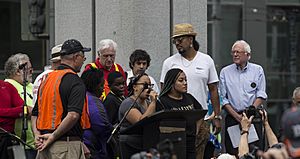Marissa Johnson facts for kids
Quick facts for kids
Marissa Jenae Johnson
|
|
|---|---|

Marissa Johnson at microphone at an August 2015 political rally in Seattle, with U.S. presidential candidate Bernie Sanders standing aside
|
|
| Born | 1990/1991 |
| Education | Seattle Pacific University |
| Organization | Black Lives Matter |
Marissa Jenae Johnson is an American activist born in 1990 or 1991. She became well-known when she interrupted a speech by U.S. presidential candidate Bernie Sanders in Seattle in August 2015. Her work is connected to the Black Lives Matter movement, which focuses on justice and equality for Black people.
Johnson helped start a justice group in Seattle called Outside Agitators 206. This group later ended when she became a co-founder of the Seattle chapter of Black Lives Matter around September 2015.
Marissa Johnson's Activism
Before the incident with Bernie Sanders, Johnson was already known in Seattle for speaking out and sometimes interrupting public meetings. She organized a protest in November 2014 at a shopping mall in Downtown Seattle. This protest, called a die-in, caused the mall to close on Black Friday that year.
In January 2015, she spoke at a city council meeting about police using body cameras. She caused the meeting to pause and said, "I don't need a home video of my oppression."
Why Marissa Johnson Became an Activist
Marissa Johnson has a Black father and a White mother. She describes herself as a Christian and says her faith is a big reason for her activism. She believes that "white supremacy is sin," meaning she sees unfair systems that favor white people as wrong.
She graduated from Seattle Pacific University in 2013 with a degree in theology, which is the study of religious beliefs. After college, she worked as a nanny.
The moment when Johnson interrupted Bernie Sanders' speech was seen as a very important event. A political writer named Maria Tomchick said in December 2015 that it helped the Black Lives Matter movement become a major national topic in politics.
Challenges for the Seattle Black Lives Matter Chapter
While Johnson was a leader, the Seattle chapter of Black Lives Matter faced some criticism. This included concerns about comments made at rallies near a business called Uncle Ike's Pot Shop in Seattle. The owner of this business was accused of changing the neighborhood in a way that made it harder for the original Black residents to stay. This process is sometimes called gentrification.
 | Precious Adams |
 | Lauren Anderson |
 | Janet Collins |

